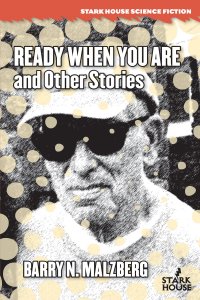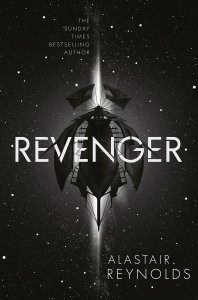Paul Di Filippo Reviews Ready When You Are and Other Stories by Barry N. Malzberg
 Ready When You Are and Other Stories, Barry N. Malzberg (Stark House Press 979-8886010473, trade paperback, 164pp, $14.95) July 2023
Ready When You Are and Other Stories, Barry N. Malzberg (Stark House Press 979-8886010473, trade paperback, 164pp, $14.95) July 2023
This accomplished, provoking, and masterful new collection from the legendary Malzberg is comprised of twenty stories not previously featured in any of his other dozen or so assemblages. With many another writer, this remit might signal a kind of barrel-scraping maneuver. But in a writer of Malzberg’s stature and productivity—so many, many stories, the vast majority of them boasting equally high caliber—knowing that these pieces were previously uncollected merely signals new diggings of high-quality ore from a famous mine.
The stories date from 1979 through 1999, thus—as Malzberg says himself—representing the core decades of his career. (He regrettably stopped writing novels in 1985, with The Remaking of Sigmund Freud.) Despite the newest one being almost twenty-five years old, they all display a topicality, freshness, wit, and vitality that is utterly au courant. I will mention here that in a day and age when, oftentimes, “feelings” in science fiction are elevated over other traditional stefnal virtues such as prophecy, gadgetry, sense of wonder, adventure, etc., Malzberg should be seen as a kind of Godfather to this postmodern approach, since all his tales—inarguably replete as they are with startling ideas and complex plotting—do tend to privilege emotional effects over other desiderata. And this focus might also explain the unremittingly tragic nature of his tales, following the famous maxim: “Life is a tragedy for those who feel, and a comedy for those who think.” Which is not to say that Malzberg’s tales do not also feature an incredible amount of his patented droll and savage humor.
Please note that Malzberg’s generous afterwords to each story are micro-essays worthy of inclusion in either of his two groundbreaking critical volumes: The Engines of the Night and Breakfast in the Ruins.
“The Twentieth Century Murder Case” reminds me of one of Woody Allen’s japes. A hard-boiled cop seeks the felon who slaughtered the personified ten decades of civilization. PR firms? Big business? Or are we all equally culpable?
Is there a secret cabal of disinformation officers seeding the public sphere with lies? (See what I meant about topicality?) You’ll find out in “Reason Seven”.
Taking Raymond Chandler’s famous slap at SF and turning it into a valid SF story is the kind of tour de force that only a few brave writers would attempt. In “Playback” Malzberg intersperses all of Chandler’s prose to demolish the mystery writer’s disdain.
“Coursing” concerns a mission to parlay with the King of the Universe which is undone by a kind of Joycean Molly Bloom unfaithfulness from an AI lover of the human diplomat.
Proving himself equally adept at crime/thriller writing as he is at SF, Malzberg offers a Cornell Woolrich shocker in “Folly for Three”.
One of Malzberg’s big themes is the ineffability and nonhuman motivations of any alien species, their cat-and-mouse playing with humanity, and this theme receives a compact workout in “Posar: With the Aliens”. Malzberg credits Bester with inspiring this tale, but I see PKD influences as well.
An homage to the surreal absurdities of Robert Sheckley, “Demystification of Circumstance” starts out in a great manner: “Hawkins lay under a rock. The rock was ten feet tall and twenty across, perhaps three feet through, although depth was of no interest to him at this time.”
If Malzberg had been hired to script Marvel’s Punisher comic, the results might have resembled “Reparations”. But of course, Malzberg’s justified killer experiences crises of conscience that Frank Castle never did.
Time travel is a recurrent chord in Malzberg’s canon, as his protagonists seek to ameliorate past failures, theirs alone or those of civilization. “The Trials of Rollo” is something like Heinlein’s The Door Into Summer, inverted and turned upside down.
Malzberg has always admired greatly James Tiptree and her uncompromisingly and authentically bleak stories. “Tap-Dancing Down the Highways and Byways of Life, etc.” reminds me of her “Painwise”, insofar as the protagonist here is also doomed to die time and again in quest of reformation and enlightenment.
Is David Bunch’s Moderan the secret engine of “What We Do on Io”…? As we watch a member of the privileged “kinglies” class cycle through one fruitless brush with omnipotence after another, I am reminded of Bunch’s depiction of megalomania.
Malzberg’s well-known series about the peculiar heaven reserved for writers gets an airing in “O Thou Last and Greatest!” Will our hero dare to confess to Flannery O’Connor and others that he labored in the déclassé field of science fiction?
The next two tales both stem from an original anthology dedicated to the fable of Aladdin. “On the Heath” brilliantly conflates King Lear with our Far Eastern hero, while “Grand Tour” introduces a wish-granting djinn into modern life in a manner that crosses Unknown magazine with John Updike.
Is bigshot Hollywood producer Finzie, in “Ready When You Are”, really at the top of the heap? Or is he experiencing some kind of bardo quasi-life? Or both?
The most political of these tales, “Anderson” follows a character who shifts unpredictably from one continuum and biography to another, with the most consequential being that of a USA President on the verge of triggering Armageddon.
Certainly the most tender and even ruefully joyful piece here is “Celebrating”. A psionically-gifted child must educate her father in what’s really important in their wild-talent lives.
“Rocket City” could have borrowed Ballard’s great title, “Myths of the Space Age”, as it details the faded interstellar dreams of humanity.
A washed-up SF writer forced to listen to a young college professor critique one of the old hack’s novels—in order to obtain some measly course credits? You must laugh so as not to cry during “The Shores of Suitability”.
And finally, interventional time-travel gets a dense but compact workout in “Shiva”, where a chrononaut’s despairing attempts to forestall tragedy all fall short.
Malzberg’s work ranks with and resonates with a special select clade of peers. Robert Silverberg, James Tiptree, Harlan Ellison. Predecessors like Bester and Sheckley, aforementioned, contribute their allegiance. And a few wild-card laterally displaced writers—George Alec Effinger, David Bunch—harken to his mournful cries as well. He has persevered through good times and bad with his droll, sardonic, pityingly compassionate worldview, seeking to refine and sophisticate SF while still honoring its primal core of astonishment. Whether or not newer writers know it, much of what they can accomplish today was opened up by Malzberg, and they are often following his footsteps into a wilderness of time, space, and the human heart.
 While you are here, please take a moment to support Locus with a one-time or recurring donation. We rely on reader donations to keep the magazine and site going, and would like to keep the site paywall free, but WE NEED YOUR FINANCIAL SUPPORT to continue quality coverage of the science fiction and fantasy field.
While you are here, please take a moment to support Locus with a one-time or recurring donation. We rely on reader donations to keep the magazine and site going, and would like to keep the site paywall free, but WE NEED YOUR FINANCIAL SUPPORT to continue quality coverage of the science fiction and fantasy field.
©Locus Magazine. Copyrighted material may not be republished without permission of LSFF.







